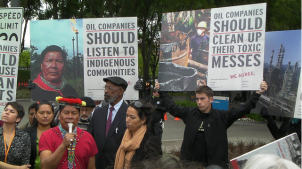
By Tjitske Lingsma.
“The rainforest is our supermarket, our hospital, pharmacy, our school, and it is where we pray,” says Humberto Piaguaje, chief of Ecuador’s Secoya indigenous group, speaking at a Hague Talks discussion timed to coincide with the annual state parties meeting of the International Criminal Court (ICC). In stark contrast with the audience in The Hague, he wears a white tunic, overlaid by long, colourful beads crossing at the waist, and a red and yellow headdress. The Secoya see themselves as part of their habitat, the Amazon rainforest, where each earthly element has a living spirit identity. “The trees are our siblings,” the chief explains. “That’s why we feel so hurt when someone comes and destroys our land.”
A group of 30,000 Ecuadorian indigenous people and farmers have been taking various cases to courts over what they claim is destruction of their environment and way of life. They now seek to convince The Hague court to revise its founding Rome Statute to have jurisdiction over their grievances, summed up as ecocide. Piaguaje says his people began suffering from “ecocide” – crimes against the environment – when in 1964 petroleum company Texaco started drilling for oil on their homeland. Trees were cut, and oil spills and toxic waste dumps polluted the land, groundwater, rivers and streams, destroying the livelihood of several indigenous tribes, claims the chief. Texaco (acquired by Chevron in 2001) left Ecuador in 1992, but campaigners say damage and contamination are continuing to cause harm because the mess has not been cleaned and crude oil is bubbling from the ground.
Several lawsuits were filed, according to Pablo Fajardo Mendoza, the acclaimed Ecuadorian lawyer representing 6,000 indigenous people, including the Secoya, and 25,000 farmers in Ecuador. In 2011, Ecuadorian courts ruled that Texaco/Chevron should pay clean-up costs and reparations amounting to 18 billion dollars (17 million euros) – later reduced to 9.5 billion dollars. But the oil giant filed a complaint with a US court, which ruled the Ecuadorian case against the company “fraudulent”. So far, Chevron has paid no reparations. “The justice system doesn’t protect people and nature, but protects the corporations that are cruising around in impunity,” Fajardo says during the Hague Talks discussion.
A new crime?
In October 2014, Fajardo sent details of his clients’ complaints to the ICC. Six months later, he received a standard letter from the Office of the Prosecutor saying that the “allegations appear to fall outside the jurisdiction of the court”. The ICC can prosecute genocide, crimes against humanity and war crimes (and – potentially, if ICC member states agree – aggression), but not ecocide. The Rome Statute’s only reference to it comes under war crimes, in article 8(2)(b)(iv): “widespread, long-term and severe damage to the natural environment”. Ecocide might sound new, but the concept has been around since the 1970s. The Human Rights Consortium at the University of London published a 2012 research paper detailing how “ecocide” was present early on in the negotiations that led to establishing the ICC though its scope was drastically narrowed. “The idea was very much alive in the Nineties when the Rome Statute was debated,” says Michael Baumgartner of Greenpeace Switzerland. “In fact, ecocide was already accepted as the fifth crime against peace. There was a majority in favour to include it. But a minority of four countries killed it off. Now we are reintroducing it.”
A sign of the attempted reintroduction came in November at a first-ever ecocide side event, which was organized by Greenpeace, during the ICC members meeting. Baumgartner says that judges and NGOs he met were “sympathetic” to the idea of giving the court jurisdiction over environmental crimes. Some campaigners, it seems, relish the prospect of putting individuals on trial at the ICC – if found guilty, they can be imprisoned and forced to personally pay reparations to victims. The impact of such cases would be different, unlike the system of fines paid by multinationals for environmental damage, says Baumgartner. “It will have a huge impact if the ICC will be able to prosecute a CEO who signed off on policies that led to ecocide,” he explains. “Indeed, people are getting worried. I met a high official working for a multinational who said that he did not want his children to have a criminal father.”
No appetite among states?
Writing in ecocide as the fifth crime against peace in the Rome Statute would not be easy. The ICC is facing financial constraints [IJT-172] and is lately under heavy pressure from states that are unhappy with the court’s singular prosecution of Africans. Plus, sceptics abound. “Protecting the environment is extremely important,” says Lyal S. Sunga, head of the Rule of Law program of The Hague Institute for Global Justice, but “there is not a lot of appetite among countries to amend the Rome Statute, and I haven’t seen sufficient evidence to support a new crime of ecocide.” One hurdle is that for environmental damage to be a crime under ICC jurisdiction, “criminal intent” must be proven. Sunga also asks “why ecological harm should take precedence over more established crimes such as drug trafficking, human trafficking, terrorism or use of nuclear weapons” – all of which are also not included in the Rome Statute, but are considered priority points by many member states. “I am not very convinced,” Sunga concludes. But as for Secoya chief Piaguaje, he plans to persist. “We will continue to look for reparations for our people and for our future. We will continue to look for justice,” he says.

The project ENVJUSTICE has received funding from the European Research Council (ERC) under the European Union’s Horizon 2020 research and innovation programme (grant agreement No. 695446)